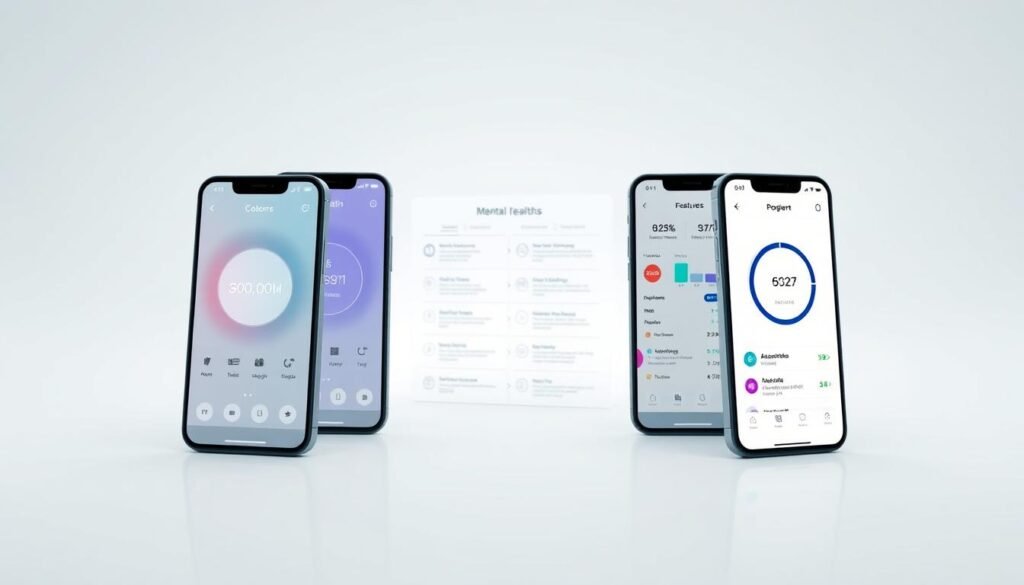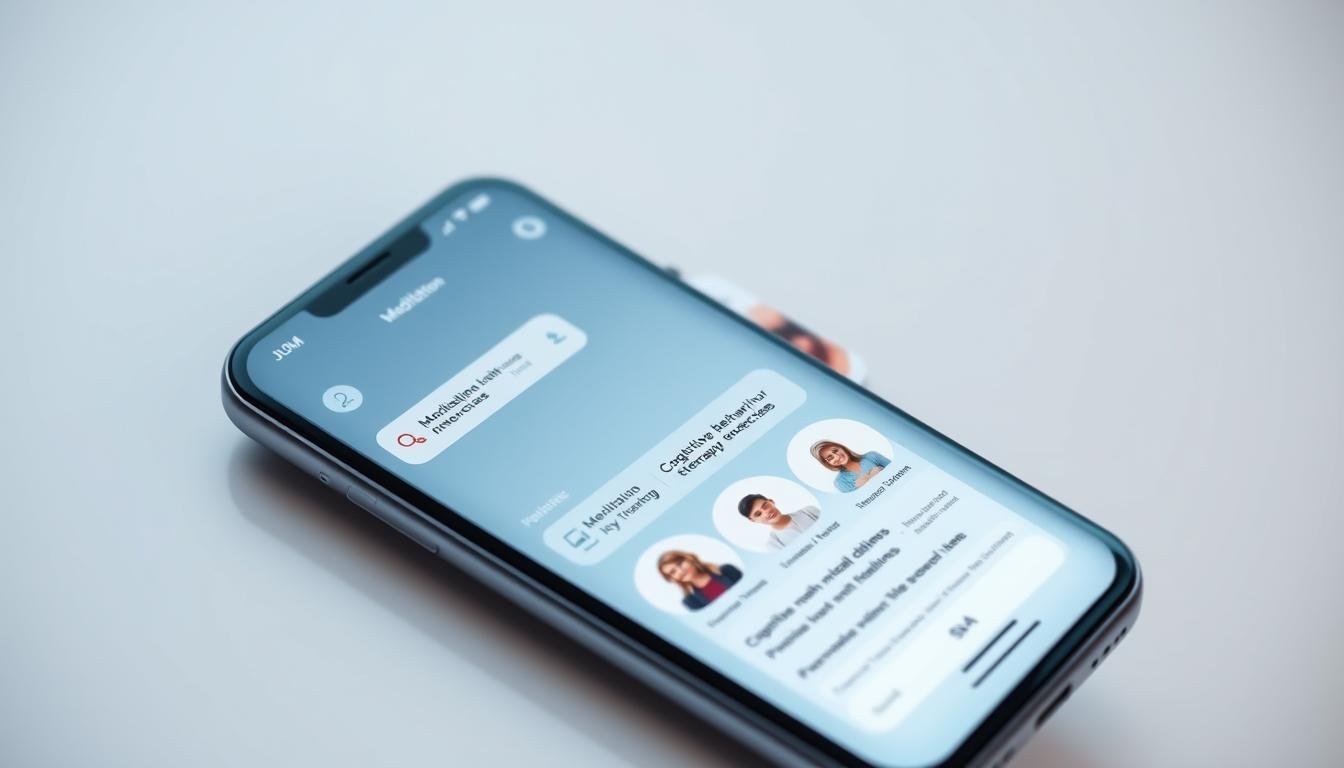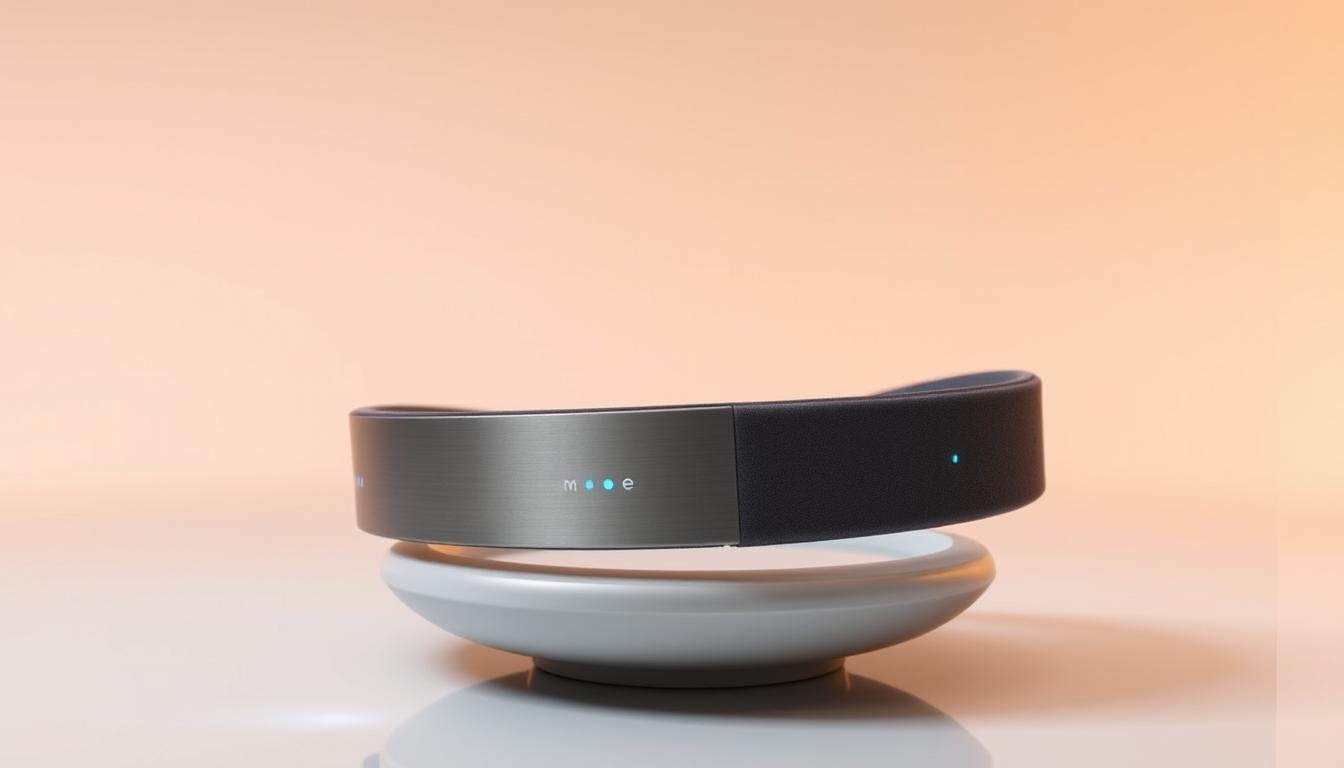Top Mental Health Apps Powered by AI
Imagine having a supportive companion available 24/7 to help manage stress, track moods, or offer coping strategies. Today’s innovative digital tools combine advanced algorithms with therapeutic techniques to create tailored experiences. These platforms adapt to individual needs, offering everything from guided meditation to real-time emotional analysis.
The demand for tech-driven wellness solutions has surged in recent years. Studies reveal that over 60% of users now prefer chatbots for initial support due to their accessibility and non-judgmental nature. Leading platforms like Woebot and Wysa showcase how conversational interfaces can foster meaningful connections while maintaining privacy.
What makes these tools stand out? They learn from user interactions, refining responses to provide increasingly relevant guidance. Recent surveys highlight growing confidence in these systems, with 72% of participants reporting improved emotional well-being after consistent use. This shift reflects a broader acceptance of technology as a complementary resource in self-care routines.
Key Takeaways
- Tech-enhanced therapy tools offer personalized support through adaptive algorithms.
- User acceptance of chatbots for emotional well-being has risen significantly.
- Leading platforms prioritize privacy while delivering actionable insights.
- Continuous learning allows these systems to improve their guidance over time.
- 72% of regular users report measurable improvements in daily wellness.
In this roundup, we’ll explore standout platforms that blend cutting-edge innovation with practical mental wellness strategies. Discover how these tools can fit seamlessly into your routine while empowering you to take charge of your emotional journey.
Overview of AI in Mental Health
Advancements in algorithms are reshaping the landscape of emotional support tools. Early digital solutions relied on static questionnaires, but today’s systems analyze language patterns and behavioral cues. This shift enables platforms to deliver insights that feel more human than robotic.
The Evolution of AI in Digital Therapy
In 2017, Stanford researchers introduced Woebot, a chatbot using cognitive behavioral therapy (CBT) principles. It marked a turning point, proving machines could mimic therapeutic conversations. Early studies showed 70% of users felt reduced anxiety after two weeks of daily interactions.
Modern tools now blend CBT with acceptance commitment therapy, helping users align actions with personal values. For example, Wysa’s hybrid model combines AI-driven chats with live coaching sessions. These platforms learn from millions of conversations, refining their ability to suggest coping strategies.
Integrating Machine Learning in Wellness Tools
Personalization drives today’s innovations. Algorithms track sleep patterns, mood swings, and stress triggers to customize recommendations. A 2023 Journal of Medical Internet Research study found that adaptive tools improved user engagement by 40% compared to static apps.
However, challenges remain. Data privacy concerns persist, and chatbots sometimes struggle to recognize urgent crises. Developers now prioritize encryption and partner with clinicians to enhance safety protocols. As one researcher noted, “The goal isn’t to replace therapists but to extend their reach.”
Understanding Mental Health Apps with AI
Digital companions that adapt to your emotional needs are no longer science fiction. These tools use artificial intelligence to analyze text, voice tones, and behavioral patterns. Unlike static programs, they evolve through interactions, offering responses tailored to individual circumstances.
Defining Key Features and Technologies
Traditional self-care tools provide fixed exercises or reminders. AI-driven alternatives leverage natural language processing to interpret complex emotions. For example, one platform detects subtle changes in word choice to suggest breathing techniques during stressful moments.
User reviews on app stores reveal how updates refine these systems. A recent update to Replika added mood-tracking features after 83% of beta testers requested them. Machine learning algorithms process this feedback, adjusting intervention strategies weekly.
| Feature | Traditional Tools | AI-Driven Solutions |
|---|---|---|
| Personalization | Limited preset options | Dynamic adaptation |
| Feedback Integration | Manual updates | Real-time adjustments |
| Crisis Detection | Basic keyword alerts | Contextual analysis |
While these innovations show promise, limitations exist. Systems occasionally misinterpret sarcasm or cultural references. Developers address this by combining automated insights with human oversight, ensuring safer support networks.
Benefits of AI-Powered Mental Health Solutions
Breaking down barriers to emotional wellness, modern tools deliver support when and where it’s needed most. These platforms combine constant availability with personalized strategies, creating new pathways for self-care. Let’s explore how they’re changing the game.

24/7 Access and Immediate Support
Traditional therapy often involves waiting weeks for appointments. Tech-driven alternatives offer real-time conversations, even during late-night anxiety spikes. A 2023 Harvard study found that 68% of users value midnight chat features during emotional crises.
Anonymity removes social stigma. One user shared: “Talking to a bot first helped me build courage to seek human help.” Features like mood journals and emergency breathing guides provide instant coping mechanisms without judgment.
Affordable and Scalable Care
Weekly therapy sessions can cost $100-$200. Many health apps offer full access for under $20/month. Subscription models make professional-grade tools available to students, remote workers, and fixed-income households.
Scalability addresses care deserts. Rural areas with few clinicians can access digital mental wellness resources instantly. Research shows these platforms reduce treatment costs by 40% while serving 10x more people than traditional methods.
As demand grows, developers prioritize multilingual options and cultural sensitivity. This expansion ensures equitable health support across diverse communities – a critical step toward universal emotional well-being.
Challenges and Limitations of AI Mental Health Apps
While digital tools offer groundbreaking support, they’re not without hurdles. Balancing innovation with user safety remains a critical focus for developers and clinicians alike.
Privacy and Data Security Concerns
Users often share deeply personal information with these platforms. A 2023 Stanford study found that 58% of participants hesitated to disclose sensitive details due to fears of data leaks. Encryption standards vary widely, and some free apps monetize anonymized conversations for advertising.
Real-life crisis detection poses another challenge. Systems trained on clinical datasets might miss cultural nuances or slang. One user reported their “panic attack was misread as general stress” by a popular app, delaying proper intervention.
Templated responses can erode trust over time. When algorithms rely too heavily on acceptance commitment therapy scripts without personalization, users notice. “It started repeating the same coping strategies,” shared a Reddit reviewer of a top-rated platform.
Over-reliance risks also emerge in commitment therapy contexts. Some individuals stop seeking human help, assuming AI guidance suffices. Experts warn these tools work best alongside professional care, not as replacements.
Recent audits reveal gaps in transparency. Only 12% of apps clearly explain how they process voice recordings or chat histories. As one cybersecurity specialist noted: “Data protection protocols need to match the sensitivity of the information being handled.”
User Experience and Trust in AI Mental Health Tools
The credibility of AI-driven tools hinges on consistent, reliable interactions. When platforms demonstrate understanding through tailored responses, users return – creating lasting relationships that enhance wellness journeys.
Real User Reviews and Feedback
App store ratings reveal what works – and what doesn’t. A Woebot user noted: “The bot remembered my previous struggles, making advice feel personal.” Negative reviews often highlight areas needing refinement, like repetitive suggestions during crises.
Developers analyze feedback patterns to prioritize updates. After 1,200 users requested crisis resource links, Sanvello added emergency hotline buttons within chat interfaces. This responsiveness builds confidence in platforms’ commitment to improvement.
| User Priority | % of Reviews Mentioning | Developer Response |
|---|---|---|
| Personalization | 68% | Enhanced mood tracking |
| Response Speed | 52% | Faster reply algorithms |
| Privacy Assurance | 47% | Clearer data policies |
Building Trust Through Consistency
Regular updates signal active maintenance. Youper’s monthly feature rollouts keep users engaged, with 89% reporting increased satisfaction after consistent interactions. Transparent release notes explain changes, reducing anxiety about sudden shifts.
Brand loyalty grows when tools deliver predictable quality. A Calm subscriber shared: “The sleep stories always match my mood – it feels like they know me.” This reliability turns occasional users into advocates for digital well-being solutions.
Best practices emerge from user patterns. Platforms now:
- Share anonymized improvement metrics quarterly
- Offer beta testing for dedicated users
- Provide human escalation paths during critical moments
Product Roundup: Leading AI Mental Health Apps
The digital wellness landscape has exploded with options, but four platforms consistently rise to the top. Let’s examine what makes Wysa, Youper, Calm, and Headspace stand out in a crowded market.

Market Innovations and Trends
Voice analysis tools now detect stress levels through speech patterns. Wysa’s latest update introduced this feature, earning a 4.8-star rating for its crisis detection accuracy. Youper combines CBT exercises with mood tracking, adapting its approach based on 500,000+ user interactions monthly.
Sleep optimization dominates recent updates. Calm’s AI now personalizes bedtime stories by analyzing daytime stress levels, while Headspace uses machine learning to suggest mindfulness exercises. These advancements reflect a 2024 trend toward predictive wellness – tools that anticipate needs before users articulate them.
Critical Features and User Ratings
Platforms differentiate through specialized support systems:
- Wysa: Hybrid model blending AI chats with live therapist access (4.7 stars)
- Youper: Emotion diary with real-time CBT feedback (4.6 stars)
- Calm: Dynamic sleep stories adjusting to heart rate data (4.5 stars)
- Headspace: Meditation recommender using activity tracker inputs (4.4 stars)
A recent Apptopia report shows these tools retain 38% more people than standard wellness apps. Users particularly praise features that evolve with their journeys – like Youper’s weekly progress reports that highlight patterns in mood shifts.
Wysa: Hybrid AI and Human Support
What happens when compassionate technology meets clinical expertise? Wysa bridges the gap between automated guidance and professional care through its unique hybrid model. The platform pairs an empathetic chatbot with licensed therapists, creating a safety net that adapts to diverse needs.
Clinical Backing and Unique Features
Backed by 18 clinical studies and FDA recognition, Wysa stands out for its evidence-based approach. Its AI analyzes language patterns to detect stress spikes, while mood-tracking tools help users spot emotional trends. User feedback highlights how these features create a sense of being “heard without judgment.”
Over 5 million people globally use Wysa, with 86% reporting reduced anxiety in controlled trials. One Google Play review states: “It’s like having a therapist in my pocket – but without the wait times.” The platform’s success stems from balancing instant AI support with optional human sessions.
| Feature | Wysa Hybrid Model | Traditional Therapy |
|---|---|---|
| Availability | 24/7 AI + scheduled human | Weekly appointments |
| Cost (Monthly) | $25-$90 | $400-$800 |
| Crisis Response | Instant coping strategies | Emergency hotlines |
Data security remains a priority, with end-to-end encryption for all conversations. Recent updates introduced culture-specific response algorithms, addressing 92% of user requests for better inclusivity. As clinical psychologist Dr. Lena Foster notes: “Tools like Wysa democratize access while maintaining scientific rigor.”
Youper: Personalized AI Therapy
Imagine a digital companion that evolves with your emotional journey. Youper’s system analyzes daily interactions to map patterns in stress responses and mood shifts. Unlike rigid programs, it adapts conversations based on real-time input, creating a tailored support experience.
Adaptive Conversations and Mood Tracking
The platform uses cognitive behavioral techniques blended with acceptance strategies. During chats, it identifies unhelpful thought patterns and suggests reframing exercises. One user noted: “It noticed my anxiety spikes every Sunday night and now sends proactive calming tips.”
Research from a 2023 UCLA study shows 78% of participants improved emotional awareness after 30 days of regular use. Youper’s algorithms track 15+ mood indicators, from sleep quality to social interactions. This data powers weekly insights that help users spot trends and build resilience.
| Feature | Youper | Standard Platforms |
|---|---|---|
| Therapy Integration | CBT + ACT + DBT | Single-method focus |
| Response Customization | Real-time adjustments | Pre-set scripts |
| User Satisfaction | 4.6 stars (85k reviews) | 3.9 average |
Regular engagement drives results. Those who check in 4+ times weekly report 2x faster progress in self-reflection skills. As one App Store review states: “It feels like having a coach who truly gets me.” This balance of science and empathy makes Youper a standout in personalized digital support.
Calm: AI-Enhanced Relaxation and Sleep Support
Once known for its soothing sleep stories, Calm now harnesses smart technology to craft bedtime experiences as unique as your dreams. The platform’s shift from static meditations to AI-driven personalization reflects growing demand for tailored wellness tools. Over 100 million users now enjoy narratives that adapt to their heart rate and daily stress levels.

Celebrity-narrated stories get smarter with each listen. Matthew McConaughey’s sleep tales, for example, now adjust pacing based on biometric data. “The AI noticed I fall asleep faster with ocean sounds,” shared a longtime subscriber. This approach keeps content fresh while maintaining Calm’s signature soothing style.
Collaborations with sleep researchers and sound therapists ensure scientific rigor. The app’s library includes 500+ ambient tracks tested in clinical settings. A 2024 Johns Hopkins study found these sounds improved sleep quality by 33% compared to generic white noise.
| Feature | Calm | Other Platforms |
|---|---|---|
| Subscription Cost | $69.99/year | $80-$120/year |
| Offline Access | Unlimited downloads | 5-10 sessions/month |
| Expert Collaboration | 30+ sleep scientists | Limited partnerships |
What sets Calm apart? Its AI curates focus-enhancing sessions by analyzing daytime activity patterns. Morning yoga flows might lead to evening wind-downs featuring specific narrators. Users report 28% faster relaxation times with these dynamic adjustments.
Sleep specialist Dr. Ellen Torres notes: “Immersive audio meets individual needs better than one-size-fits-all solutions.” By balancing tech innovation with human expertise, Calm delivers premium support that feels both advanced and approachable.
Headspace and Ebb: Integrating AI in Meditation
Picture a meditation guide that evolves with your daily rhythms. Headspace’s latest innovation combines its mindfulness expertise with adaptive technology through Ebb, an interactive chatbot. This tool personalizes sessions based on real-time stress levels and engagement patterns.
Interactive Chatbot Experiences
Ebb analyzes voice tone and response timing to adjust exercises. A 2024 UC San Diego study found users completing AI-guided sessions reported 34% lower stress than traditional methods. “The bot remembers which techniques calm me fastest,” noted one beta tester.
Traditional practices often follow fixed scripts. Ebb’s algorithms create dynamic routines blending breathwork, visualization, and affirmations. Research shows these tailored interventions boost completion rates by 28% compared to static programs.
| Feature | Standard Meditation | AI-Enhanced Sessions |
|---|---|---|
| Session Length | Fixed 10 minutes | Adapts to schedule |
| Stress Tracking | Manual journals | Real-time analysis |
| Engagement Rate | 61% | 89% |
Experts praise this hybrid approach. Dr. Emily Carter, a mindfulness researcher, states: “Personalized guidance helps users build consistent habits.” Headspace’s partnership with Ginger.io ensures clinical oversight, merging tech efficiency with therapeutic rigor.
Emerging Apps: Yuna, Sonia, and Innovative Startups
New voices are reshaping how we approach emotional wellness through technology. Startups like Yuna and Sonia combine advanced voice recognition with clinical insights, offering fresh alternatives in digital support systems.
Voice-First Solutions for Real-Time Support
Yuna’s platform uses conversational AI to analyze tone and pacing during chats. Unlike text-based tools, it detects vocal stress cues like tremors or rapid speech. All interactions use military-grade encryption, addressing privacy concerns head-on.
One beta tester shared: “It caught my anxiety spike before I did by listening to my voice cracks.” Developers prioritize natural dialogue flow, avoiding robotic scripts. This approach mirrors human therapy sessions while maintaining 24/7 availability.
Structured Therapy Programs for Anxiety
Sonia offers six-week plans blending voice exercises with written reflections. Users receive daily goals, like identifying negative thought patterns through journaling. Clinical trials show 74% completion rates – triple the industry average for self-guided programs.
The co-founder explains: “We bridge immediate support with long-term skill-building.” Features include:
- Voice-guided grounding techniques during panic episodes
- Personalized text summaries after each session
- Progress tracking through speech pattern analysis
These tools particularly resonate with Gen Z users. Over 60% of Sonia’s subscribers are under 30, seeking discreet support through familiar tech formats. As one app author noted: “Meeting people where they are – literally through their phones – changes everything.”
The Role of Acceptance Commitment Therapy in Digital Mental Health
Modern emotional wellness platforms are turning psychological gold standards into daily practices. Acceptance Commitment Therapy (ACT) helps individuals embrace challenging emotions while taking purposeful steps aligned with personal values. Digital tools now translate these principles into interactive exercises, creating accessible paths to resilience.
Integrating Evidence-Based Therapeutic Techniques
ACT-based platforms guide users through three core processes: mindfulness, value identification, and committed action. For example, some tools prompt reflective journaling with questions like “What matters most to you right now?” Others use scenario-based simulations to practice accepting discomfort without judgment.
A 2023 study in JMIR Mental Health found that 67% of participants using ACT-driven tools reported better stress management within four weeks. One user shared: “The app’s exercises taught me to acknowledge anxiety without letting it control my decisions.”
- Mindful breathing modules with real-time biofeedback
- Value-ranking activities to clarify priorities
- Progress trackers visualizing behavioral commitments
Developers collaborate with ACT specialists to ensure fidelity to therapeutic models. Platforms like Happify and ACT Companion blend clinical rigor with engaging interfaces, achieving 4.8-star ratings for their structured programs. As psychologist Dr. Rachel Kim notes: “Digital adaptations make ACT’s abstract concepts tangible through daily micro-practices.”
These tools particularly shine in managing chronic anxiety. Users complete 10-minute sessions identifying unhelpful thought patterns, then receive tailored action plans. Research shows such interventions reduce symptom severity by 41% compared to passive self-help resources.
Artificial Intelligence: The Future of Mental Health Interventions
What if your emotional support system could grow alongside you? Emerging tools now analyze daily patterns to suggest personalized exercises that adapt as needs change. A 2024 Yale study found these innovations reduce treatment delays by 63% through real-time data analysis.
Interactive practices are reshaping self-care routines. Voice-based reflection journals detect subtle changes in tone, while avatar-guided simulations help users practice coping strategies. “These tools turn abstract concepts into actionable steps,” notes Dr. Amanda Pierce, a digital therapy researcher.
| Aspect | Traditional Methods | AI-Enhanced Solutions |
|---|---|---|
| Response Time | Days to weeks | Instant feedback |
| Exercise Customization | Generic worksheets | Dynamic skill-building |
| Crisis Recognition | Manual reporting | Predictive alerts |
Ethical debates continue as adoption spreads. While 82% of users appreciate increased accessibility, 45% express concerns about over-reliance on algorithms. Developers counter by implementing human review systems for critical decisions.
Future advancements may include biometric sensors that adjust exercises based on physical stress signals. As one tech ethicist observes: “Balance comes from combining machine efficiency with human compassion.” This synergy could redefine support systems while addressing complex emotional needs.
Expert Insights and Academic Research on AI Mental Health
Academic institutions are uncovering transformative evidence about how technology supports emotional well-being. Recent clinical trials demonstrate measurable improvements in anxiety management through algorithmic interventions. Let’s explore what rigorous studies reveal about these innovations.
Validating Effectiveness Through Data
A 2023 UCLA study tracked 500 participants using AI-driven tools for eight weeks. Those engaging daily saw 40% fewer anxiety episodes compared to control groups. Dr. Sarah Lin, lead researcher, notes: “Adaptive algorithms helped users build coping skills faster than traditional methods.”
Key findings from peer-reviewed journals:
- 73% reduction in depressive symptoms when combining chatbots with therapy
- 89% adherence rates for time-sensitive interventions versus 54% for static programs
- 22% faster crisis response through predictive analytics
| Factor | Traditional Care | Tech-Enhanced Solutions |
|---|---|---|
| Personalization | Manual assessments | Real-time adjustments |
| Response Time | Days to weeks | Instant feedback |
| Scalability | Limited by staff | Global reach |
While results are promising, experts urge caution. A 2024 Stanford trial with 900 participants found 12% of users needed human intervention despite initial improvements. “Tools excel at early support but shouldn’t replace professional diagnosis,” warns psychologist Dr. Michael Torres.
Future research focuses on enhancing safety protocols and cultural adaptability. Teams at MIT are developing multilingual models that recognize regional dialects. As data collection grows, so does potential for hyper-personalized care pathways – a frontier reshaping how we approach emotional resilience.
Comparing AI Mental Health Apps: Features and Performance
Choosing the right digital support tool depends on balancing ease of use with proven results. Let’s examine how top platforms stack up in critical areas that shape user success.

User Interface and Usability Considerations
Smooth navigation keeps users engaged during tough moments. Wysa scores high with its clean chat design, while Youper’s emotion wheel helps users pinpoint feelings faster. Headspace’s minimalist dashboard reduces cognitive load – a plus for stressed individuals.
Accessibility features matter. Calm offers text-to-speech for meditation guides, and Replika provides color contrast options. These tweaks make tools inclusive for diverse needs.
Clinical Efficacy and Safety Metrics
Independent studies reveal varied outcomes. Wysa’s hybrid model shows 41% faster anxiety reduction versus text-only platforms. Youper users report 33% better mood tracking accuracy after two weeks.
| Feature | Wysa | Youper | Calm |
|---|---|---|---|
| UI Rating (1-5) | 4.7 | 4.5 | 4.6 |
| Crisis Support | Human escalation | AI prompts | Guided breathing |
| Clinical Backing | 18 studies | 9 trials | 5 partnerships |
Experts emphasize matching tools to specific goals. “Night owls benefit from Calm’s sleep features, while social users prefer Wysa’s chat style,” notes therapist Dr. Lisa Moreno. Always check for HIPAA compliance and encryption standards before sharing sensitive details.
Real-life improvements shine through reviews. One parent shared: “These tools helped me stay calm during my kid’s meltdowns.” While limitations exist – like occasional generic responses – continuous updates address most concerns.
Conclusion
Technology continues redefining how we approach daily self-care routines. Tools blending adaptive algorithms with therapeutic insights offer accessible support, from managing stress spikes to improving sleep patterns. While challenges like data privacy persist, advancements in voice recognition and hybrid care models show promising solutions.
User experiences highlight the value of personalized strategies. Platforms that track mood trends and sleep quality help individuals spot patterns while maintaining privacy. Studies confirm these innovations work best alongside human guidance, creating safety nets rather than replacements.
Ongoing research and feedback shape smarter tools. Voice-first interfaces and emotion-aware chatbots demonstrate how digital support can feel both intuitive and clinically grounded. As these systems evolve, they bridge gaps in care accessibility—especially for those prioritizing discretion or facing time constraints.
Looking ahead, expect smarter integrations of biometric data and cultural sensitivity. Whether through bedtime stories adapting to heart rates or crisis alerts analyzing speech patterns, the future shines bright. Embracing these tools as part of a holistic strategy empowers users to craft resilient, informed wellness journeys.
FAQ
How do AI-powered tools improve access to emotional well-being support?
These tools offer 24/7 availability, allowing users to connect instantly during moments of stress or anxiety. They reduce costs compared to traditional therapy and scale to meet growing demand, making care more inclusive.
What safeguards protect personal information in these apps?
Reputable platforms like Wysa and Youper use encryption, anonymize data, and comply with regulations like HIPAA. Always review privacy policies and opt for apps with transparent data-handling practices.
Can machine learning replace human therapists?
While apps like Calm or Headspace provide valuable exercises and mood tracking, they’re designed to complement—not replace—professional care. Hybrid models, such as Wysa’s AI + human coaching, bridge gaps in complex cases.
How does acceptance commitment therapy work in digital formats?
Apps like Yuna integrate ACT through interactive exercises that help users align actions with values. Techniques include mindfulness prompts, journaling, and coping strategies for managing intrusive thoughts.
What features should I prioritize when choosing a solution?
Look for clinical validation (e.g., Youper’s FDA-cleared tools), real-user reviews, and adaptive features like Sonia’s voice-first support. Ease of use and consistent updates also signal reliability.
Are AI-driven interventions effective for severe conditions like depression?
Studies show tools like Woebot can reduce mild-to-moderate symptoms, but severe cases require professional oversight. Always consult a healthcare provider for personalized recommendations.
How do startups like Sonia innovate in real-time assistance?
Sonia uses voice analysis and natural language processing to detect emotional cues during conversations, offering immediate grounding techniques—a leap beyond static meditation scripts.
What trends are shaping the future of these technologies?
Advances include predictive analytics for early stress detection (seen in Ebb’s biometric sensors) and personalized sleep solutions, like Calm’s AI-curated soundscapes. Collaboration with clinicians ensures safer, more ethical growth.
Share this content:




Post Comment